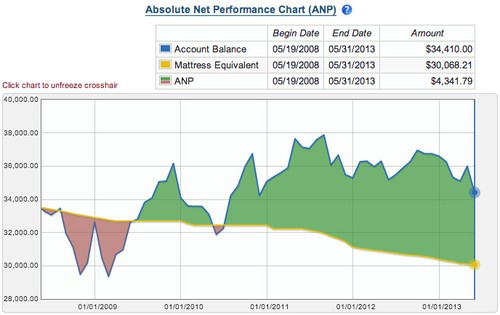What s the Difference Between an ETF and a Mutual Fund Green Money StreamGreen Money Stream
Post on: 6 Август, 2015 No Comment

As my husband and I were driving the other day I was telling him about a recent investment I had made in our Vanguard brokerage account. I told him I had purchased some more shares of one of my favorite Vanguard ETFs. His response was “Oh, thats great.” Then after a pause he asked, “So what is the difference between an ETF and a mutual fund?” As I answered his question it occurred to me that hes probably not the only one to be confused by the two. So I thanked him for helping me come up with my next post topic!
Mutual funds and exchange traded funds (ETFs) are similar as both are comprised of a group of securities which make up the fund. Because of this grouping, an investor can purchase shares of a mutual fund or ETF and gain broad exposure to a market index or sector. This can be an efficient way to diversify an investment portfolio. Without these funds, individual investors would have to buy hundreds or even thousands of different securities to achieve this diversification.
Even though mutual funds and ETFs are similar, there are some key differences to be aware of.
One big difference between ETFs and mutual funds is the expenses paid by the investor. Expense ratios for ETFs are generally lower than those for mutual funds. One reason for this is that ETFs tend to be passively managed, meaning they are set up to replicate a certain index like the S&P500. Many mutual funds on the other hand, are actively managed meaning they seek to outperform the index. This increases the operating expenses as the mutual fund company has to pay the funds active managers and this expense is passed along to the investor. In addition to operating expenses, mutual funds can often have other types of fees including front- or back-end loads which are commission or redemption charges as well as 12b-1 charges which is a fee that helps pay for the funds advertising, annual reports, prospectus, and commissions paid to brokers.
Even mutual funds that are not actively managed can have higher fees than ETFs. Take, for example, the comparison between Vanguards 500 Index Fund (VFINX) and the Vanguard S&P 500 ETF (VOO). These are both S&P 500 index funds with virtually identical composition. However the total expenses for the mutual fund are 0.17% as compared to 0.05% for its ETF counterpart. The breakdown is shown below (this information was taken from each respective fund prospectus).














